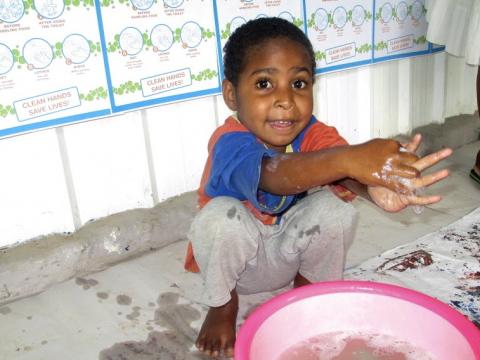Hand Washing with Soap Keeps the Doctor Away

By Helen Tuka and Moresi Tua, WV PNG Communications
Clean and safe hygiene practices are often easily forgotten by children and even adults, which can lead to increase in disease outbreaks. The most common killer diseases in children are the likes of dysentery and diarrhea caused by improper hygiene practices.
Children can be agents of change when best practices learned from the classroom are adapted into homes and so improve the health status of their families and communities overall.
During Global Hand Washing Day on October 15th, school children in several World Vision’s target communities observed the event to learn and become hand- washing ambassadors within their own families and communities.
Children participated in the activities organized by the project team including drawing competitions, quizzes, and drama. After learning about hand washing, the children participated in competitions, even assembling their own hand washing stations using tippy taps.
“I wash my hands with soap before eating and after eating too, also I wash my hands after playing,’’ said 5 year-old Gidae Joel after showing how she washes her hands. Speaking softly and with a little difficulty the ECCD student added: “The hand washing activity is good for me to know more about health.’’
Five-year old girl, Lavina Wala said: “After going to the toilet I wash hands with soap at the tap, then I go to the house…if I don’t wash hands, I can get sick with stomach ache.’’
